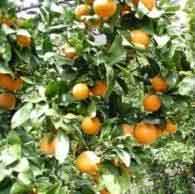This is the VOA Special English Agriculture Report.
Alternate bearing is a widespread problem for growers of citrus and other fruit trees. It can affect a large area or just individual trees or even part of a tree. No, it is not a disease. Alternate bearing is when a tree produces a heavy crop one year, called an "on-crop," followed by an "off-crop" the next year.
On-crop trees produce a large number of small fruit with little value. Off-crop trees produce no fruit or a small number of large fruit that often have thick, unappealing skins.

Citrus growers know that the number of fruit in their current crop has an inverse effect on the number of flowers in the return bloom. In other words, if one number is big, the other number will be small.
Two researchers recently did a study to understand how this happens. Johannes Verreynne is now at Stellenbosch University in South Africa. Carol Lovatt is at the University of California, Riverside. They studied "Pixie" mandarin trees in the Ojai Valley of California. Mandarin oranges are also known as tangerines.
The study showed that fruit on the tree reduces the next bloom by stopping buds from appearing. This limits the number and length of summer and fall shoots. As a result, there is a reduction in the number of nodes, or joints, that produce groups of flowers along stems. Fruit on the tree during spring bloom stops the growth of flowering shoots.
During an on-crop year, growers often treat the fruit so it can stay on the tree longer. The purpose is to extend the harvest season. Yet Carol Lovatt says holding fruit on the tree makes alternate bearing worse. The researchers advise growers to investigate the effects of thinning or pruning to reduce the number of fruit in early summer of the on-crop year.
The findings appeared in the Journal of the American Society for Horticultural Science.
Other kinds of trees that can experience alternate bearing include nut trees. Scientists recently studied the effects of mechanical thinning on two kinds of pecan trees in the southeastern United States. The results from the University of Georgia appeared in HortTechnology, also published by the society.
The study compared trees that had been thinned by machine with those that had not been thinned. The findings suggest that thinning during the on-crop year can increase the value of off-year pecan crops.
And that's the VOA Special English Agriculture Report, written by Jerilyn Watson. I'm Bob Doughty.
citrus: any tree or shrub of the tropical and subtropical rutaceous genus Citrus, which includes the orange, lemon, lime, grapefruit, citron, and calamondin 柑橘屬植物
tangerine: a widely cultivated variety of mandarin orange having deep red-orange fruit with easily separated segments 橘子
node: the point on a stem where a leaf is attached or has been attached; a joint 莖節(jié)
pecan: a deciduous tree of the central and southern United States, having deeply furrowed bark, pinnately compound leaves, and edible nuts 美洲薄殼胡桃樹
Related stories:
Poultry farms with unhappy neighbors? Plant some trees
Study finds more trees on farms than was thought
Insects eating your crops? Call on a ladybug
Grafting in agriculture
(Source: VOA 英語點津編輯)